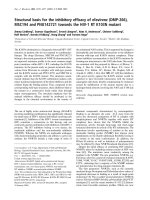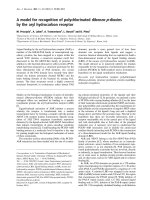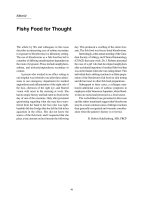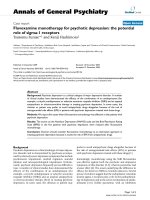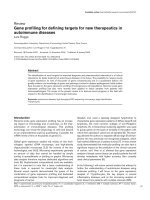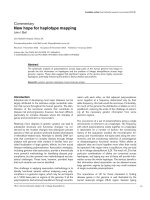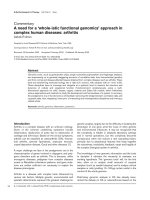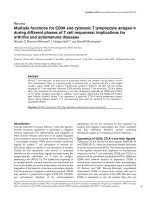Báo cáo y học: "Fishy Food for Thought" potx
Bạn đang xem bản rút gọn của tài liệu. Xem và tải ngay bản đầy đủ của tài liệu tại đây (70.73 KB, 1 trang )
48
The article by Wu and colleagues in this issue
describes an interesting case of asthma secondary
to exposure to bloodworms in a laboratory setting.
The use of bloodworms as a fish food has led to
a number of differing manifestations dependent on
the route of exposure. These include anaphylaxis,
asthma, and urticaria/angioedema secondary to
contact.
A person who worked in an office setting in
our hospital was referred to me after three admis-
sions to our emergency department for marked
angioedema and inflammation of the right side of
the face, chemosis of the right eye, and blurred
vision with onset in the morning at work. She
had no atopic history and had eaten no food on the
day of one of the reactions. Only after persistent
questioning regarding what she may have trans-
ferred from her hand to her face (she was right-
handed) did she divulge that she fed the fish in her
aquarium in the office. She did not know the
source of the fish food, and I requested that she
place a tiny amount on her forearm the following
day. This produced a swelling of the entire fore-
arm. The fish food was freeze-dried bloodworms.
Interestingly, at the annual meeting of the Cana-
dian Society of Allergy and Clinical Immunology
(CSACI) that same week, Dr. J. Roberts presented
the case of a girl who had developed anaphylaxis
after accidental ingestion of residual fish food that
was on her hands when she was eating dinner. This
individual had a striking reaction to a dilute prepa-
ration of the bloodworm fish food on skin testing
and did not react to other fish food preparations.
Subsequent to these cases, a colleague men-
tioned additional cases of asthma symptoms in
employees at the Vancouver Aquarium, where blood-
worms are raised and processed as a food source.
The well-defined case presented in this issue
and the others mentioned suggest that bloodworm
may be a more common cause of allergic reactions
than generally recognized and warrants consider-
ation when the patient’s history is reviewed.
R. Robert Schellenberg, MD, FRCP
Editorial
Fishy Food for Thought

